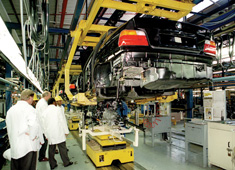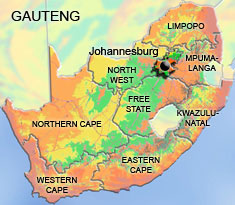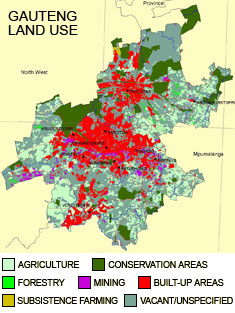Opportunities
Investing in Gauteng
 Gauteng provincial government - The Department of Finance and Economic
Affairs of the Gauteng provincial government oversees the financial health of the
province, provides payment and accounting services, oversees
provincial
procurement, and promotes the economic development of Gauteng by providing a
number of essential economic development functions.
Gauteng provincial government - The Department of Finance and Economic
Affairs of the Gauteng provincial government oversees the financial health of the
province, provides payment and accounting services, oversees
provincial
procurement, and promotes the economic development of Gauteng by providing a
number of essential economic development functions.
 The Gauteng Economic Development Agency (Geda) is an investor's first
port of call for developing business relations in Gauteng and the rest of Africa.
Geda is Gauteng's official economic, investment and trade promotion agency and its
mission is to promote the economic growth and development of the province.
Geda identifies and markets investment opportunities in the province and responds to
requests for
assistance from potential local and foreign investors. It also hosts regular
outward missions and provides local industry with opportunities to bid for local and
international tenders, with specific emphasis on the European market in the
engineering parts industry.
Geda's activities take their lead from three approaches that form the basis of the
Gauteng government’s economic strategy. These are:
The Gauteng Economic Development Agency (Geda) is an investor's first
port of call for developing business relations in Gauteng and the rest of Africa.
Geda is Gauteng's official economic, investment and trade promotion agency and its
mission is to promote the economic growth and development of the province.
Geda identifies and markets investment opportunities in the province and responds to
requests for
assistance from potential local and foreign investors. It also hosts regular
outward missions and provides local industry with opportunities to bid for local and
international tenders, with specific emphasis on the European market in the
engineering parts industry.
Geda's activities take their lead from three approaches that form the basis of the
Gauteng government’s economic strategy. These are:
- The realignment of the manufacturing sector away from traditional heavy industry input markets and low value added production towards sophisticated, high value added production, as well as the development of other high value added production activities in the agriculture and mineral sectors.
- The development of the province as the smart centre of the country with specific emphasis on information technology, telecommunications equipment, research and development and bio medical industries.
- The development of the finance and business service sector with specific emphasis on financial services and technology, auxiliary business services and technology, corporate head office location and business tourism.
 The Gauteng Tourism Authority was created to stimulate, co-ordinate and
facilitate sustainable tourism development and marketing of the Gauteng province.
Its objective is to create a world-class destination that will attract tourists, business
people and all other visitors who will contribute to the province's economic growth and
benefit the communities.
The Gauteng Tourism Authority was created to stimulate, co-ordinate and
facilitate sustainable tourism development and marketing of the Gauteng province.
Its objective is to create a world-class destination that will attract tourists, business
people and all other visitors who will contribute to the province's economic growth and
benefit the communities.
 Blue IQ - Gauteng has taken charge of its own spatial development initiative
programme and runs it under the project name Blue IQ.
The emphasis of the programme is on innovation-related industries, financial and
business services and value-added high-tech manufacturing. Gauteng has made a
strategic decision to move away from traditional heavy industry and low-value-added
products. It is now committed to enhancing its reputation for being the country's
"Smart Centre".
Finance and industry
The most important economic sectors are financial and business services, logistics
and communications, and mining.
Gauteng is the financial capital of Africa: more than 70 foreign banks have their head
offices in the province, and at least that number of South African banks, stockbrokers
and insurance giants. The JSE in Johannesburg is the 17th-largest stock
exchange in
the world by market capitalisation.
The province’s economy is moving away from traditional heavy industry markets and
low value-added production towards sophisticated high value-added production,
particularly in information technology, telecoms and other high-tech industries.
In an international survey in 2000, Gauteng was identified as one of 46 global hubs of
technological innovation. The burgeoning high-tech corridor in Midrand, halfway
between Pretoria and Johannesburg, is the fastest-developing area in the country.
The province has the best telecommunications and technology on the continent, with
correspondents for the world's major media stationed here, as well as South Africa's
five television stations. It also has the highest concentration of radio, internet and
print media in Africa.
Manufacturing includes basic iron and steel, fabricated and metal products,
food,
machinery, electrical machinery, appliances and electrical supplies, vehicle parts and
accessories, and chemical products.
Blue IQ - Gauteng has taken charge of its own spatial development initiative
programme and runs it under the project name Blue IQ.
The emphasis of the programme is on innovation-related industries, financial and
business services and value-added high-tech manufacturing. Gauteng has made a
strategic decision to move away from traditional heavy industry and low-value-added
products. It is now committed to enhancing its reputation for being the country's
"Smart Centre".
Finance and industry
The most important economic sectors are financial and business services, logistics
and communications, and mining.
Gauteng is the financial capital of Africa: more than 70 foreign banks have their head
offices in the province, and at least that number of South African banks, stockbrokers
and insurance giants. The JSE in Johannesburg is the 17th-largest stock
exchange in
the world by market capitalisation.
The province’s economy is moving away from traditional heavy industry markets and
low value-added production towards sophisticated high value-added production,
particularly in information technology, telecoms and other high-tech industries.
In an international survey in 2000, Gauteng was identified as one of 46 global hubs of
technological innovation. The burgeoning high-tech corridor in Midrand, halfway
between Pretoria and Johannesburg, is the fastest-developing area in the country.
The province has the best telecommunications and technology on the continent, with
correspondents for the world's major media stationed here, as well as South Africa's
five television stations. It also has the highest concentration of radio, internet and
print media in Africa.
Manufacturing includes basic iron and steel, fabricated and metal products,
food,
machinery, electrical machinery, appliances and electrical supplies, vehicle parts and
accessories, and chemical products.
- Johannesburg Chamber of Commerce
- Benoni Chamber of Commerce
- Gauteng North Chamber of Commerce
- Khayalami Chamber of Commerce
- Download the Department of Trade and Industry's Provincial Economic Overview (1.8 MB) here.
Would you like to use this article in your publication or on your website? See: Using SAinfo material
 BMW manufacturing plant in Rosslyn, Gauteng province (Image: BMW South Africa)
BMW manufacturing plant in Rosslyn, Gauteng province (Image: BMW South Africa)
 Gauteng takes up 1.4% of South Africa's total land area (Image: Mary Alexander)
Gauteng takes up 1.4% of South Africa's total land area (Image: Mary Alexander)
 Map: Department of Environment and Tourism
Map: Department of Environment and Tourism
Related links
Gauteng: fast facts
Capital: Johannesburg
Languages: 19.8% isiZulu, 12.4% Afrikaans, 11.6% Sesotho, 13.3% English
Population: 12 272 263 (2011)
Share of total SA population: 23.7%
Area: 16 548km2
Share of total SA area: 1.4%
Population density: 675 people per km2
Gross regional product: R897,6-billion (2010)
Share of total SA GDP: 33.7%
Languages: 19.8% isiZulu, 12.4% Afrikaans, 11.6% Sesotho, 13.3% English
Population: 12 272 263 (2011)
Share of total SA population: 23.7%
Area: 16 548km2
Share of total SA area: 1.4%
Population density: 675 people per km2
Gross regional product: R897,6-billion (2010)
Share of total SA GDP: 33.7%
Provincial investment guide
South Africa's provinces
Cities gallery
Johannesburg is the City of Gold, Cape Town the Mother City and Bloemfontein the Flower of the Free State. Take a photo tour of SA's world-class African cities.
SA industry gallery
SA is the powerhouse of Africa, with the most advanced, broad-based industrial sector on the continent.
Infrastructure photo gallery
Transport, energy, telecommunications: South Africa has the infrastructure of a fully developed country.
SA's countryside gallery
Step out of the urban centres and you'll find a different South Africa, an unexplored place of beautiful contrasts.






